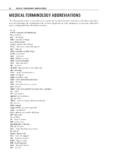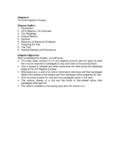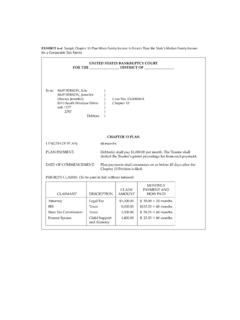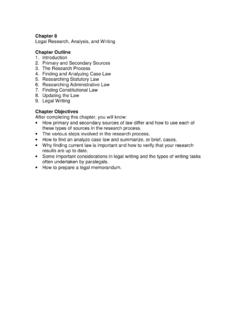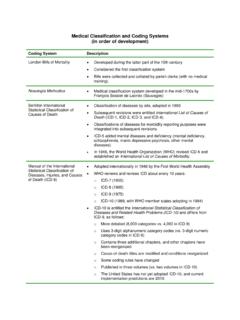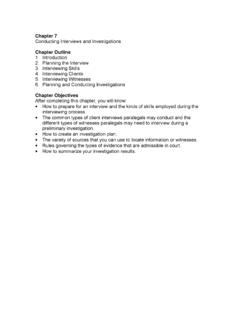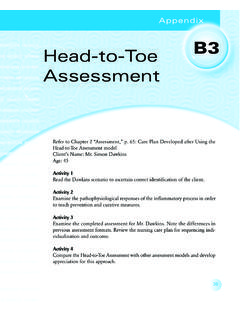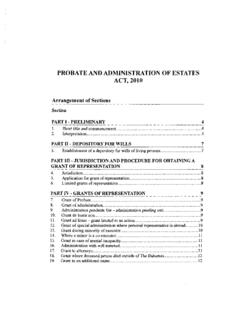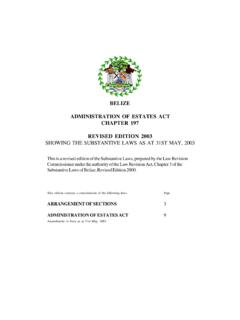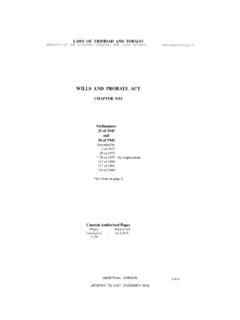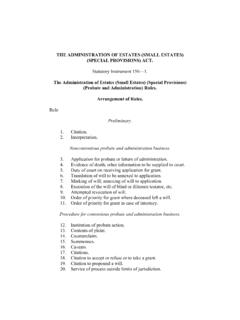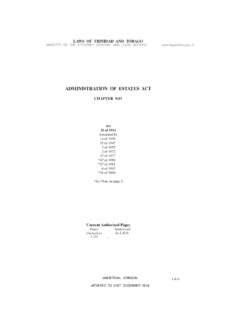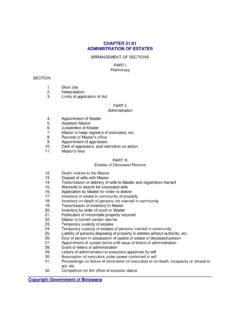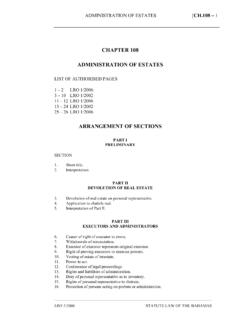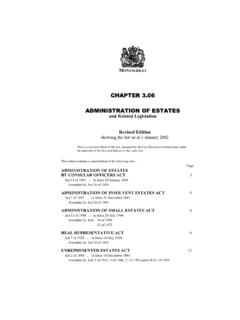Transcription of 13 INFORMAL PROBATE ADMINISTRATION - Brands Delmar
1 94 INFORMALPROBATEADMINISTRATIONTHE CHOICE OF FORMAL OR INFORMAL PROBATE (HOWER 466) INFORMAL PROBATE in California is governed by the provisions of the Independent Adminis-tration of Estates Act (Prob 10400, et seq.) ( IAEA ). Absent a restriction in the will of thedecedent which does not permit the independent ADMINISTRATION of the estate (Prob 10404)or objection by an interested person based on a showing of good cause (Prob 10452), admin-istration with full authority (without court supervision) or with limited authority (with lim-ited court supervision) will be granted by the court upon petition by the personal represen-tative. Prob authority means the authority to administer the estate including all powers exceptthe power to: Sell real property. Exchange real property. Grant an option to purchase real property. Borrow money with the loan secured by an encumbrance upon real OF PERSONS SEEKING APPOINTMENT ASPERSONAL REPRESENTATIVES (HOWER 468)The priority for appointment as personal representative does not change under the Indepen-dent ADMINISTRATION of Estates administrator may be granted authority if the special administrator is appointedwith, or has been granted, the powers of a general personal representative.
2 Prob FOR INFORMAL PROBATE AND APPOINTMENTOF PERSONAL REPRESENTATIVE (HOWER 468)Apetition for independent ADMINISTRATION is included in the petition for appointment of thepersonal representative in a separate petition, requesting either full or limited REQUIREMENTS (HOWER 472)Notice requirements are as for the petition for appointment of the personal representative pre-viously described, but must include in substance a statement that:The petition requests authority to administer the estate under the IndependentAdministration of Estates Act. This will avoid the need to obtain court approval formany actions taken in connection with the estate . However, before taking certain ac-tions, the personal representative will be required to give notice to interested personsunless they have waived notice or have consented to the proposed ADMINISTRATION authority will be granted unless good cause is shownwhy it should not be. Prob the hearing, an interested person may object to appointment.
3 Unless good cause is shownwhy the estate should not be administered independently, the court will grant the requestedauthority. If good cause is shown, the court may either deny independent ADMINISTRATION , orgrant it with only limited authority. Prob the personal representative is granted only limited authority, a bond amount will befixed in the sum of the value of the personal property and annual gross income; if granted fullauthority, the bond amount will be the foregoing plus the value of any real property in the es-tate. Prob petition by an interested person, notice of the hearing (which is not less than fifteen(15) days after its filing), for good cause shown the authority of the personal representative,may be revoked or limited by the court. In either event, the personal administrator s letters arerevoked; in the former case, a new personal representative issued a new letter, and in the lat-ter, new letters are issued to the existing personal AND POWERS OF THE PERSONALREPRESENTATIVE IN INFORMAL PROBATE (HOWER 475)The personal representative has full authority to administer the estate (to the extent authorityhas been granted to do so in the letters issued) without court supervision, subject to express re-striction in a will, if any (Prob 10502).
4 Prob 10500(a).The personal representative, if granted full authority, is not required to abide by restric-tions as to public versus private sales of property, sales with or without notice, court confir-mation of sale, or rules regarding the minimum acceptable value received for property 10503. However, the personal representative may also seek and obtain court supervisionat any time for any act (Prob 10500(b)), and is required to obtain court supervision for: Allowance of compensation to the personal representative. Allowance of compensation to the attorney for the personal representative. Settlement of accounts. Sale, exchange, or grant of an option of property of the estate to the personal representativeor to the attorney for the personal representative. Allowance, payment, or compromise of a claim of the personal representative of the attor-ney for the personal representative. Settlement or compromise of a claim, action, or proceeding by the estate against the personalrepresentative or the attorney for the personal representative.
5 Extension, renewal, or modification of the terms of a debt or other obligation of the personalrepresentative or the attorney for the personal representative owing in favor of the decedentor the of Devisees or Heirs and Creditors (Hower 475)Apersonal representative must give notice to interested parties of the following actions(Prob 10510): Sale or exchange of real property (Prob 10511). Sale incorporation of business (Prob 10512). Abandonment of tangible personal property (Prob 10513). Borrowing or encumbering property (Prob 10514). Granting options to purchase real property (Prob 10515). Transferring property to optioners in will (Prob 10516). Conveyances by contract with the decedent (Prob 10517). Determining claims to property (Prob 10518). Making disclaimers (Prob 10519). Making preliminary property distributions (Prob 10520).Notice of the following actions may be required under certain circumstances (Prob 10530): Entering into contracts which cannot be fully performed by their terms within two (2) years,unless the personal representative has an unrestricted right to terminate the contract withintwo (2) years (Prob 10532).
6 Investing in securities maturing more than one year from the date of investment (Prob 10533). Continuing as a general partner for more than six (6) months after the date of the first is-suance of letters (Prob 10534). Making the first payment of a family allowance or increasing the payment of a family al-lowance (Prob 10535). Leasing real property to another for a term in excess of one year (Prob 10536). Selling or exchanging personal property (except securities generally) (Prob 10537). Granting an extension of an exclusive right to sell real property to a broker which exceeds 270days from the date of the first grant (Prob 10538).And, no notice is required in the following situations (Prob 10550): Exercising any powers otherwise not requiring court approval under the PROBATE Code(Prob 10551). Allowance, payment, acceptance, rejection, compromise, settlement, or release of any claimagainst the estate or the personal representative (Prob 10552).
7 Commence, maintain, and defend actions (Prob 10553). Extend, renew, and modify obligations owing to the decedent or estate (Prob 10554). Transfer or convey property to carry out a granted specific power (Prob 10555). Pay taxes, assessments, and expenses incurred in ADMINISTRATION (Prob 10556). Purchase annuities (Prob 10557).9697 Exercise options (Prob 10558). Purchase securities to perform decedent s contract of sale (Prob 10559). Hold securities in the name of a nominee (Prob 10560). Exercise subscription or conversion rights (Prob 10561). Repair and improve real and personal property (Prob 10562). Accept deeds or deeds in trust in lieu of foreclosure (Prob 10563). Give partial satisfactions or reconveyances under deeds of trust (Prob 10564).Where notice is required, it must be given to each known devisee or heir, and all who have re-quested special notice and the Attorney General if any part of the estate may escheat (Prob 10581)by personal service or mail at least fifteen (15) days prior to the date of the proposed action spec-ified in the notice (Prob 10586); however, notice need not be given to any who have consented tothe proposed action in writing or who have waived notice in writing either before or after theproposed action has taken place.
8 Prob notice must specify: The name and address of the personal representative. The person and telephone number to call for further information. The proposed action (if regarding real property, the material terms of the proposed pur-chase, sale, option, and brokerage arrangement and fees). The date on which the proposed action will be must contain a form for objecting to the proposed action. If the Judicial Council form ofnotice is not used, the notice used must be in substantially the same form as the Judicial Coun-cil form. Prob a party objects to the proposed action, it must submit its written objection to the personalrepresentative delivered or received on or before the date of the proposed action in the noticeor the action itself, whichever is later. Prob 10587. Alternatively, an objecting party may seek arestraining order from the court prohibiting the personal representative from undertaking theaction. Prob 10588. If a party does not object, seek a restraining order, consents, or waives no-tice, it cannot later seek court review of the proposed action, absent a showing of incapacityand lack of notice.
9 Prob an action is one for which court supervision would otherwise be required absent the au-thority granted under the IAEA, the personal representative must seek court supervision. If theact is one for which no court supervision would otherwise be required, the personal represen-tative is required to seek court instruction. The personal representative can only undertake theproposed action in accordance with the terms of the court s order or instruction. Prob action undertaken by the personal representative in violation of the previous provi-sions is invalid with regard to bona fide purchasers or the rights of third parties dealing ingood faith with the personal representative (and there is no duty to inquire of the personal rep-resentative s authority or compliance) (Prob 10591); however, the court may itself give the re-quired notice and the personal representative is subject to removal from office. Prob

